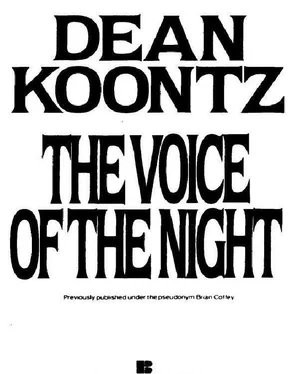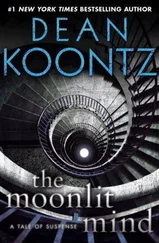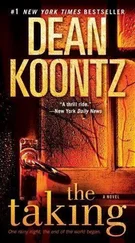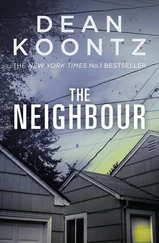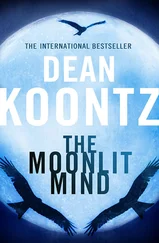“You realize the kind of lab equipment they’ve got? They can trace you by a single hair, a thread, almost anything.”
“But if we could snuff her in such a way that they’d never in a million years think it was just kids that did it…”
“How?”
Roy continued to pace. “We’d make it look like some raving lunatic killed her, some sex maniac. We’d stab her a hundred times. We’d cut off her ears. We’d slice up the brat pretty good, too, and we’d use blood to write a lot of crazy things on the walls.”
“You’re really gross.”
Roy stopped pacing and stared hard at him. “What’s the matter? Are you a sissy about blood?”
Colin felt queasy but tried not to show it. “Even if you could mislead the cops that way, there’s too many other things wrong with your plan.”
“Like what?”
“Someone will see us going into the Callahan place.”
“Who?”
“Maybe somebody taking out the garbage. Or somebody washing windows. Or just somebody going by in a car.”
“So we’ll use the Callahans’ back door.”
Colin glanced out the window. “Looks to me like that wall goes all around the property. We’d have to enter by the front walk and go around the house to get to the back door.”
“Nah. We could climb over the wall in a minute.”
“If anyone saw us, they’d be sure to remember. Besides, what about fingerprints when we get into the house?”
“We’ll wear gloves, of course.”
“You mean we’ll walk up to the door wearing gloves in ninety-degree heat, carrying a lot of rope and a knife-and she’ll let us in without a second thought?”
Roy was becoming impatient. “When she opens the door, we’ll move so fast she won’t have time to realize anything’s wrong.”
“What if she does? What if she’s faster than we are?”
“She won’t be.”
“We’ve at least got to consider the possibility,” Colin insisted.
“Okay. I’ve considered it, and I’ve decided it’s nothing to worry about.”
“Another thing. What if she opens the inner door but not the storm door?”
“Then we’ll open the storm door,” Roy said. “What’s the problem?”
“What if it’s locked?”
“Christ!”
“Well, we have to expect the worst.”
“Okay, okay. It’s a bad idea.”
“That’s what I said.”
“But I’m not giving up.”
“I don’t want you to give up,” Colin said. “I’m enjoying the game.”
“Sooner or later, I’ll find the right setup. I’ll find someone for us to kill. You better believe it.”
For a while they took turns watching Sarah Callahan through the binoculars.
Earlier, Colin had been eager to tell Roy about Heather. But now, for reasons he couldn’t quite define, he felt the time wasn’t right. For the moment Heather would be his little secret.
When Sarah Callahan finished sunning herself, Colin and Roy went down to the garage and passed Monday afternoon with the trains. Roy engineered elaborate wrecks and laughed excitedly each time the cars plunged off the tracks.
That night Colin telephoned Heather, and she accepted a movie date for Wednesday. They talked almost fifteen minutes. When Colin finally hung up, he felt that his happiness was a visible light, that it was radiating from him in a golden nimbus; he was glowing.
Colin and Roy spent part of Tuesday at the beach, getting tanned and watching the girls. Roy seemed to have lost interest in his macabre game; he didn’t say a single word about killing anyone.
At two-thirty Roy stood up and brushed sand from his bare legs and his cut-off jeans. He had decided it was time to go back into town. “I want to stop by your mother’s gallery.”
Colin blinked. “What for?”
“To look at the paintings, of course.”
“Why?”
“ ‘Cause I’m interested in paintings, dummy.”
“Since when?”
“Since always.”
“You never mentioned it before.”
“You never asked,” Roy said.
They rode their bicycles back to town and parked on the sidewalk in front of the gallery.
A few browsers were in the shop. They moved slowly from painting to painting.
Weezy’s business partner, Paula, was sitting at the big antique desk in the far right comer of the room, where sales were written. She was a wispy, freckled woman with lustrous auburn hair and large glasses.
Weezy was circulating among the browsers, offering to answer any questions they might have about the paintings. When she saw Colin and Roy, she headed straight for them, smiling stiffly. It was clear to Colin that she thought a pair of sandy, sweaty, bare-chested boys in cut-off jeans were definitely not conducive to business.
Before Weezy could ask them what they wanted, Roy pointed to a large painting by Mark Thomberg and said, “Mrs. Jacobs, this artist is terrific. He really is. His work has a lot more depth than the two-dimensional stuff that most current painters are turning out. The detail is really something. Wow. I mean, it almost looks like he’s trying to adapt the style of the old Flemish masters to a more modem sort of viewpoint.”
Weezy was surprised by Roy’s observations.
Colin was surprised, too. More than surprised. Stunned. Depth? Two-dimensional? Flemish masters? He gaped at Roy, amazed.
“Are you interested in art?” Weezy asked.
“Oh yes,” Roy said. “I’m thinking of majoring in art when I go to college. But that’s still a few years away.”
“Do you paint?”
“A little. Mostly watercolors. I’m not really very good.”
“I’ll bet you’re being modest,” Weezy said. “After all, you apparently have quite an understanding of art-and a very good eye. You went right to the heart of what Mark Thornberg is trying to achieve.”
“I did?”
“Yes. That’s astounding. Especially for someone your age. Mark is attempting to take the meticulous detail and the three-dimensional techniques of the Flemish masters and combine those qualities with a modem sensibility and modem subject matter.”
Roy looked at other Thornberg canvases on the same wall as the first, and he said, “I think I detect a trace of … Jacob DeWitt.”
“Exactly!” Weezy said, astonished. “Mark is a great admirer of DeWitt. You really do have a knowledge of art. You’re quite remarkable.”
Roy and Weezy moved from one Thomberg painting to another, spending a few minutes in front of each, discussing the artist’s merits. Colin tagged along behind them, left out, embarrassed by his ignorance-and baffled by Roy’s unexpected expertise and brilliant perception.
The very first time that Weezy had met Roy, she had been favorably impressed by him. She had told Colin as much, and she had suggested that a fine boy like Roy Borden was a much better influence than the few bookworms and social rejects with whom he had previously established tenuous relationships. She had seemed unaware that he, too, was a bookworm and a social reject and that her words stung him. Now she was intrigued by Roy’s interest in fine arts. Colin could see the delight in her eyes. Roy knew how to be charming without ever seeming phony, insincere. He could win the approval of virtually any adult-even those he secretly despised.
In a flash of jealousy, Colin thought: She approves of him more than she does of me. The way she’s looking at him! Has she ever looked at me like that? Hell, no. The bitch!
The intensity of his sudden anger surprised and disconcerted him. As Weezy and Roy looked at the last of the Thornberg paintings, Colin struggled to regain control of himself.
A few minutes later, outside the gallery, as he and Roy were climbing on their bicycles, Colin said, “Why didn’t you ever tell me you were interested in art?”
Читать дальше
